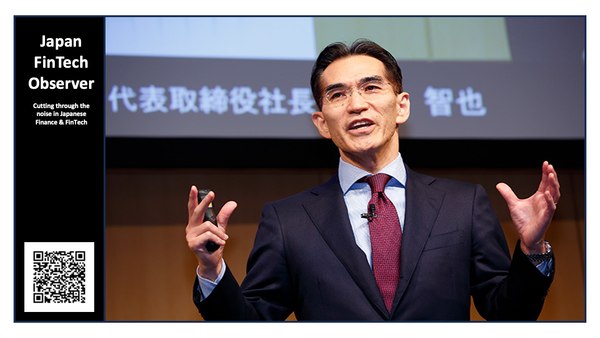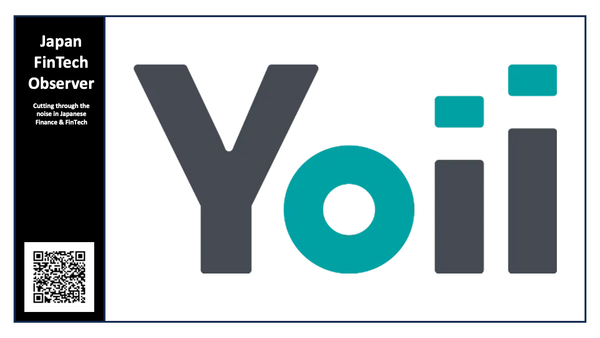Japan FinTech Observer #120

Welcome to the one hundred twentieth edition of the Japan FinTech Observer.
There is a new chief in town. In a management roster published on July 8, the FSA lists Hiroyuki Natori as the Director of the Innovation Promotion Office and Chief FinTech Officer. In addition, the new position of Counsellor for Crypto Assets, Blockchain and Innovation is taken up by Yoshichika Imaizumi. Natori was previously with the Supervision Bureau, Banking Division II, Cooperative Finance Office, and Imaizumi previously headed the Asset Management Reform Office. Ryosuke Ushida, Chief FinTech Officer since October 2022, was not available for comment.

A brief word on the Upper House elections on July 20: while a Yomiuri Shimbun poll saw the ruling coalition of LDP and New Komeito falling short by as much as 10 seats of the required 50 to maintain its majority, an Asahi poll predicted a much tighter race, with LDP and New Komeito failing by a single seat. Although Ishiba is certainly facing many headwinds, this election is far from a foregone conclusion.
Here is what we are going to cover this week:
- Venture Capital & Private Markets: Sumitomo Mitsui Banking Corporation has made an investment in Interstellar Technologies; The University of Tokyo Edge Capital Partners (UTEC) has raised its sixth fund at USD 326m; UPSIDER Capital Corporation has completed the final close of the second venture debt fund at around USD 100m
- Insurance: Mitsui Sumitomo Insurance has decided to acquire Time Machine Underwriters
- Banking: SBI Shinsei Bank prepares for re-listing; Sumitomo Mitsui Financial Group creates a new AI company in Singapore; SMBC Value Creation and AVITA have entered into a new business partnership agreement to launch a joint business utilizing avatar technology; Gojo & Company further expanded into Uzbekistan through the acquisition of a 9.8% stake in JSC Renesans mikromoliya tashkiloti
- Payments: the Bank of Japan has published the minutes from the 9th meeting of the Central Bank Digital Currency (CBDC) Liaison Council on June 4, 2025
- Capital Markets: the 22nd "Council of Experts Concerning the Follow-up of Market Restructuring" of the Tokyo Stock Exchange was held; trading volume in Japan’s power futures is set to climb as companies prepare for the upcoming expiration of a key agreement between the nation’s largest utilities; Alpaca intends to acquire WealthKernel; Fujitsu to develop ETF trading platform based on TSE's CONNEQTOR for the Australian Securities Exchange; Japan is considering to revoke the eligibility of international CO2 removal credits
- The Last Word: The 2025 Information & Communications White Paper
Venture Capital & Private Markets
Policy
- A standardized partnership framework proposed by the Ministry of Economy, Trade and Industry has the potential to significantly advance the nation's investment fund financing sector, explicitly addressing capital commitment financing mechanisms, allowing fund managers to establish collateral arrangements based on investor capital call obligations; previous regulatory guidance from over a decade ago lacked such specific provisions for these financing structures
Investments
- Sumitomo Mitsui Banking Corporation has made an investment in Interstellar Technologies (IST), a startup company aiming for vertical integration of rocket and communications satellite businesses, and has simultaneously concluded a business partnership agreement with IST regarding support for supply chain construction in the space-related industry; this marks SMBC's first investment in a space-related startup company
New funds
- The University of Tokyo Edge Capital Partners (UTEC) has raised its sixth fund, UTEC 6, with a size of JPY 47 billion (approximately USD 326 million); with the launch of UTEC 6, the firm has surpassed USD 1 billion in total assets under management (AUM), reinforcing its position as Japan's largest science & technology-focused VC firm—and one of the most prominent in Asia; UTEC 6 is purpose-built to realize the vision of creating globally competitive, multi-billion-dollar startups with Japan's scientific and industrial excellence at their core
- UPSIDER Capital Corporation has completed the final close of the second fund "UPSIDER BLUE DREAM Growth Fund 2", operated as a joint venture with Mizuho Financial Group; this Fund includes participation from multiple new investors including regional financial institutions and insurance companies in addition to Mizuho FG, and has begun operations with a total scale of 14.3 billion yen; combined with the first fund established in December 2023, the cumulative total fund amount reaches 24.3 billion yen, making it the largest scale independent venture debt fund in Japan
Other
- Inside Alternative Investment Capital’s Strategy for Japan’s Private Markets: From fund-of-funds to secondary investments, Alternative Investment Capital is redefining private equity access in Japan; in this exclusive interview, President Samura Reijiro shares how the firm is bridging domestic opportunity with global capital while supporting succession deals, carve-outs, and the rise of Japan’s secondary market through tailored solutions for LPs and GPs alike
- SEA + Japan is a long game: MUFG Innovation Partners’ Gerrard Lai on cross-border startup collaboration; and Takashi Sano, CIO of MUFG Innovation Partners discusses investment strategies to scale up Japanese and regional startups, and shares his views on the challenges that remain
- Z Venture Capital: Key Investment Focus Areas for H2 2025 / Japan
Insurance
- Mitsui Sumitomo Insurance has decided to acquire shares of Time Machine Underwriters (TMU), a Managing General Agency (MGA) specialized in Representation & Warranty Insurance in Japan; MSI plans to acquire the majority ownership share of TMU on August 1, 2025, and the remaining shares after a certain period of time to make it a 100% subsidiary; MSI, which plans to merge with Aioi Nissay Dowa Insurance around April 2027, will further enhance underwriting and marketing strategies for Representation and Warranty Insurance under the new merged company
Banking
- SBI Shinsei Bank prepares for re-listing: after committing to repaying the current remaining public funds of approximately 230 billion yen on July 31, 2025, SBI Shinsei Bank has filed a listing application with the Tokyo Stock Exchange on Friday, July 11, 2025; SBI Shinsei Bank's profits have grown from just over JPY 20bn in FY2021 to over JPY 84bn in FY2024, for a CAGR of 60.6% - this compares favorably to the "Big Three" of MUFG, Mizuho and SMBC Group with CAGRs in the ~18% range for the same period; hence, SBI will make the argument that SBI Shinsei Bank should be valued along the lines of SBI Sumishin Net Bank, which it has exited at a PBR of 4.3, rather than the pedestrian PBR of around 1 for the Big Three; the re-listing of SBI Shinsei Bank will then establish a "Fourth Megabank" as a platform with SBI Shinsei Bank in the center, and a broad range of regional banking partners connected to it
- Sumitomo Mitsui Financial Group (SMBC Group) will appoint Ahmed Jamil Mazhari to lead transformation initiatives aimed at accelerating group-wide AI strategy and integration; in partnership with Mazhari, SMFG will also establish a new agentic AI solutions company in Singapore, first serving SMBC Group as “customer zero” before expanding to the broader market; Mazhari spoke to CNBC and got asked, "Why Singapore?"
- SMBC Value Creation and AVITA have entered into a new business partnership agreement to launch a joint business utilizing avatar technology; by combining the technologies and expertise of both companies, they aim to improve productivity at Japanese companies; SMBC Value Creation has obtained approval from the Financial Services Agency for its conversion to an Advanced Banking Business Company, an entity that conducts business contributing to the improvement of convenience for bank users or business contributing to regional revitalization, productivity improvement of industries, and other sustainable society construction (a subsidiary of a bank as stipulated in Article 16-2, Paragraph 1, Item 15 of the Banking Act)
- Gojo & Company further expanded into Uzbekistan through the acquisition of a 9.8% stake in JSC Renesans mikromoliya tashkiloti (Renesans); Gojo will support Renesans to continue pursuing its mission of delivering and developing tailored microfinance services through traditional and modern channels to people in rural areas; Renesans is committed to providing convenient, accessible, and reliable microfinance services to individual entrepreneurs with a focus on women, MSMEs (micro, small, and medium enterprises), and the self-employed in rural areas of Uzbekistan; as of March 2025, Renesans serves over 14 thousand individual clients through its network of 21 branches, with a total loan portfolio of USD 17 million
- Practices and Issues on Climate-related Risk Management: in June, the FSA published the report which illustrates practices and issues of financial institutions addressing climate-related risks, followed by an English translation last week (full document and summary); those case examples are based on initiatives taken by approximately 20 financial institutions covered in the in-depth dialogue conducted in FY 2024 (from summer 2024 to summer 2025)
Payments
- The Bank of Japan has published the minutes from the 9th meeting of the Central Bank Digital Currency (CBDC) Liaison Council on June 4, 2025; the meeting covered (I) progress updates from the Bank of Japan on CBDC pilot experiments and international developments; (II) key concerns from various financial industry associations, such as standardization and interoperability issues, the cost burden and system implementation challenges, the role of CBDC relative to existing payment methods, privacy protection vs. data utilization, and cross-border payment implications; and (III) a Ministry of Finance presentation on the Second Interim Summary of the Inter-Ministry CBDC liaison meeting
Capital Markets

- The 22nd "Council of Experts Concerning the Follow-up of Market Restructuring" of the Tokyo Stock Exchange was held, with the "Future Initiatives" shown above summarizing the detailed discussions for each topic
- Trading volume in Japan’s power futures is set to climb as companies prepare for the upcoming expiration of a key agreement between the nation’s largest utilities, a shift expected to jolt the market; the power purchase pact, which gives the retail arms of Tokyo Electric Power and Chubu Electric Power access to energy from top generator JERA, will lapse at the end of the fiscal year in March; that means the two largest distributors could procure more spot electricity — or, conversely, Jera could flood the market; the shake-up is already driving hedging activity in the futures market, as traders position for potential changes in supply and demand
- Alpaca intends to acquire WealthKernel, a wealthtech firm specializing in digital investment infrastructure and tax-advantaged products; this strategic acquisition will bring WealthKernel’s UK and EU licensed brokerage infrastructure to Alpaca, supporting their rapid global expansion to achieve its mission of opening financial services to everyone on the planet; WealthKernel brings wealth management capabilities, including Individual Savings Account (ISAs), Self-Invested Personal Pension (SIPPs), and other tax-advantaged accounts, complementing Alpaca’s trading infrastructure
- Fujitsu to develop ETF trading platform based on TSE's CONNEQTOR for the Australian Securities Exchange: The Australian Securities Exchange (ASX), the Tokyo Stock Exchange (TSE), and Fujitsu have signed an MOU to develop a SaaS-based Request for Quote (RFQ) platform; Fujitsu will develop the platform based on "CONNEQTOR," an RFQ platform for the ETF market developed by TSE and Fujitsu, and provide it to ASX
- Japan is considering to revoke the eligibility of international CO2 removal credits as the country's emissions trading system, GX-ETS, gears up for its mandatory emissions reporting phase in 2026, opting only to utilize credits from domestic programs such as the J-credit or the JCM, S&P Global reports; following a governmental update to the Green Transformation Law May 28, the GX-ETS is set to transition from its voluntary trial phase to the obligatory first phase starting fiscal year 2026-27 (April-March), thereby mandating participation in the domestic ETS for facilities emitting more than 100,000 mt/year of CO2
The Last Word: The 2025 Information & Communications White Paper

Japan's Ministry of Internal Affairs and Communications (MIC) has published the "Reiwa 7 (2025) Information and Communications White Paper," presenting a critical analysis of the nation's digital landscape. Framing 2025 as a "quarter-century mark" in the 21st century, the white paper establishes its central thesis: digital technology has evolved from a mere tool into a fundamental form of "social infrastructure," as essential as roads, electricity, and water.
This transformation brings both immense opportunities and unprecedented challenges. The white paper outlines the deep penetration of digital services in daily life and business, the explosive advancements in Artificial Intelligence (AI), and the growing dominance of foreign tech giants. It contextualizes these digital trends within a broader landscape of pressing national and global issues, including geopolitical instability, intensifying natural disasters, and Japan's severe demographic decline. The document serves as a stark warning and a call to action, arguing that Japan must urgently address its digital vulnerabilities and strategically leverage technology to solve its most critical social and economic problems.

Remarkably, despite promising early data on the launch of ChatGPT, Japan faces a significant AI adoption gap.
- Individual Use: Only 26.7% of individuals in Japan have experience using generative AI services. This is dramatically lower than in the US (68.8%), Germany (59.2%), and China (81.2%). While this represents a threefold increase from 2023, the gap with other nations is widening. Adoption is highest among the youth, with 44.7% of those in their 20s having used generative AI.
- Corporate Policy: A mere 50% of Japanese companies have established a formal policy regarding the use of generative AI. This figure reveals a stark divide between large corporations (56%) and small-to-medium enterprises (SMEs), where only 34% have a defined policy. This lack of strategic implementation at the corporate level, especially among SMEs, is a major barrier to realizing AI's productivity benefits.
Another data point to highlight is Japan's labor productivity, which continues to lag behind other developed nations, ranking 26th out of 38 OECD countries in 2023. This sluggishness hampers its ability to compete globally, and is also a major obstacle for continued significant wage increases.
There is much more insightful data in the white paper, so please take a look yourself!
Please follow us to read more about Finance & FinTech in Japan, like hundreds of readers do every day. We invite you to also register for our short weekly digest, the “Japan FinTech Observer”, on LinkedIn, or here on the FinTech Observer website.
We also provide a regular short-form Japan FinTech Observer news podcast, available via its Podcast Page. Our global Finance & FinTech Podcast, “eXponential Finance” is available through its own LinkedIn newsletter, or via its Podcast Page.
Should you live in Tokyo, or just pass through, please also join our meetup. In any case, our YouTube channel and LinkedIn page are there for you as well.




